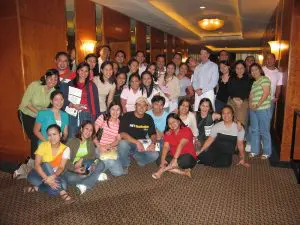Why years of experience is not enough for Contact Centre management success.
This article is part of our Contact Center Management Series — a collection of articles that bring together practical guidance and insights to help Contact Centers run better and deliver stronger results.
The Years of Experience Line
You’ve heard it before: “I have 5, 15, 35 years of experience in the industry.”
But years of experience alone has never been a reliable predictor of success in the Contact Centre profession — or any profession.
Why Years of Experience Is Not Enough
Years alone don’t guarantee growth.
As the saying goes, “Practice doesn’t make perfect — it makes permanent.”
People can spend five years repeating the same year over and over, without ever advancing their skills or impact.

The way they write their emails. Or the way they measure quality. Even the way they calculate productivity.
Sure, when you look at a calendar a number of years have gone by, let’s say five years.
But a closer look reveals that sometimes its been the same single year of experience that’s been largely repeated over and over for five years.
What’s ultimately important is the quality of experience you earn over time. Not just the duration of that experience.
Here are a few factors we see that influence that quality of experience.
Who’s Your Boss?
We know that ‘who’ you work for makes a tremendous difference in the quality of experience that you earn over time.
Some bosses develop people relentlessly, pushing them out of their comfort zone and into growth.
Others are more hands-off, or simply don’t have the depth to grow others.
“You can’t pour from an empty cup” — and not every boss has the cup filled yet.

That expression is typically used to talk about self-care.
But I think it can be repurposed to describe the depth required inside ourselves to grow the people around you.
And not everyone is ready to do that.
Who is Your Employer?
Years of experience working for a superb Employer beats years of experience working for an average Employer every time.
Sometimes when I’m asked for advice on how to grow in the industry I’ll suggest working for the very best organization you can.
Because they very often do things differently.
The Contact Centre across the street — or even a few floors up in the same building — could be delivering a very different Employee experience.
Sometimes the difference comes down to one thing: how much the company actually believes in the value of Customers and Employees.
There are very real gaps between average, good and great Employers. Don’t be fooled by fancy company names.
https://www.omnitouchinternational.com/cx-lessons-we-can-learn-from-the-contact-centre-industry
Delivering Positive Impact Does Not Require Years of Experience
 I regularly meet Contact Centre Leaders who are literally brand new to the industry.
I regularly meet Contact Centre Leaders who are literally brand new to the industry.
The mission for these new Leaders?
To put it bluntly – to fix and/or reinvigorate the Contact Centre. To bring it back to life.
Typically these people bring real-world commercial success from another department, an open & questioning mind and the ability to reimagine and redefine Contact Centre success.
I think they (often) succeed, in part, because they don’t carry the baggage of years of experience. And the hard coded beliefs that can come with that.
They don’t have to unlearn and relearn. They can just learn.
And then consider apply what they learn to the context and culture of their Organization.
Most People Don’t Go to School for This Kind of Work

There’s no question that experience matters.
Being in the trenches gives one an understanding of the job, the context and the culture that can’t be achieved by studying for an exam.
But the value of experience shouldn’t be used to denigrate or diminish the value of know-how.
What about the essential dynamics, principles & practices that have been examined, tested and used successfully in the Customer industry?
Know-how has its role too.
You wouldn’t want your appendix removed by someone who “learned on the job,” or your taxes done by someone with just a passion for numbers.
Yet in Customer Service and Contact Centres, people often end up in roles this way.
Experience matters, but so does formal know-how.
It Takes Leadership, Not Just Caretaking
Some level of caretaking will always exist.
Once a robust process has been designed and implemented it should be nurtured and protected.
So that it can grow, develop and become a natural part of how you work around around.
I think of mature Voice of Customer programs when I think of this aspect. Or I think of how Interaction Quality is defined and implemented.
But at a higher level, it’s always amazing when folks in leadership roles take a big step back and ask:
Why do we do the things we do around here?
Are there things we can do better than we are right now?
Has what has made this Organization successful up to this point going to make us successful headed into the future?
Because to make things better we almost always be dissatisfied with the status quo.
Otherwise why would we change?
So What’s the Better Formula for Contact Center Success?
(Know-How + Experience) × Regular Intervals of Reconsideration
When you’ve got mastery level Know-How of your Customer ecosystem, you avoid wasting time and effort on topics that were solved long ago and by others.
You don’t make rookie mistakes that can have lasting damage.
Experience gives you the context and culture within which your industry knowledge needs to be applied.
No two Organizations apply the same know-how in the same way – they contextualize it. That’s as it should be and it’s so impressive in practice.
And Regular intervals of reconsideration simply means that we don’t sit back and let the years go by without reconsidering what we’re doing.
To make sure that what has made us successful up to this point still makes sense for us to keep doing- or not.
The best Contact Centre folks recognize the management of the Customer ecosystem as a business discipline. No different than finance or engineering.
The best leaders don’t talk about how many years they’ve been around. They talk about the impact they’ve created — for Customers, Employees, and the Organization at large.
And that’s a cool thing.
https://www.omnitouchinternational.com/when-good-people-follow-bad-contact-centre-process
Thank you for reading!
I regularly share stories, strategies, and insights from our work across Contact Centers, Customer Service, and Customer Experience.
If you’d like to stay in the loop or get in touch:
Daniel Ord
[email protected]
www.omnitouchinternational.com



